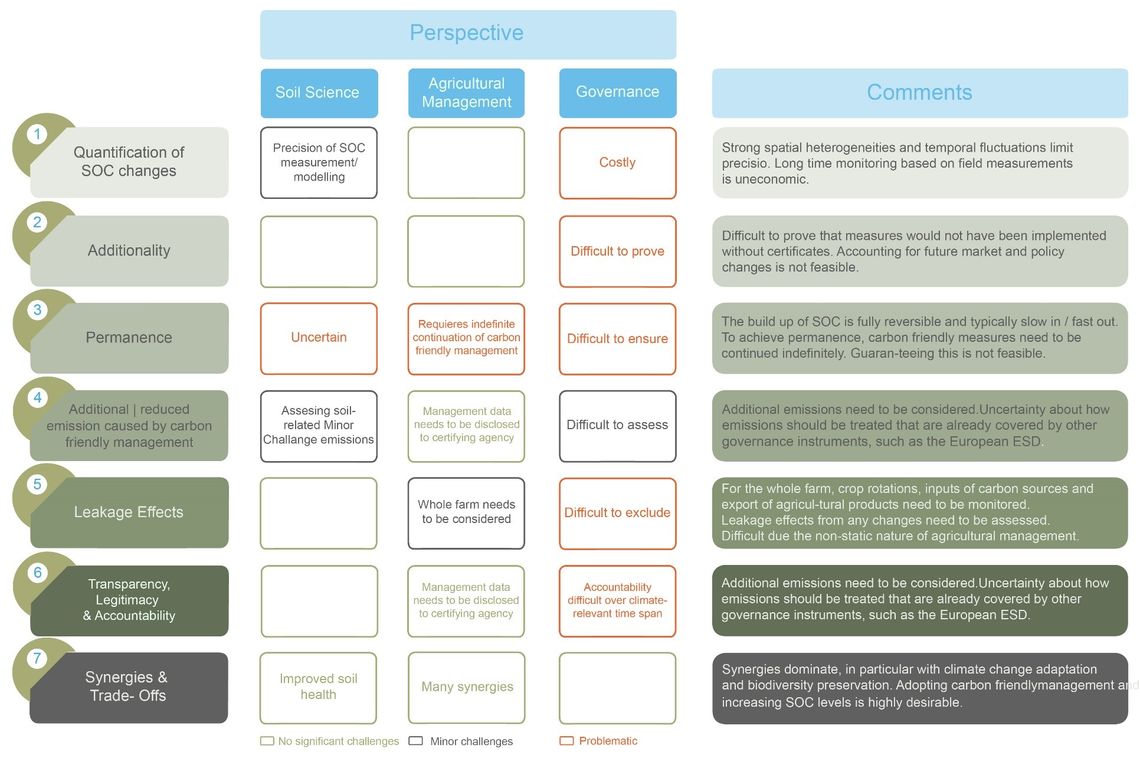Soil carbon certificates
According to state-of-the-art climate projections, negative emissions will be necessary in order to achieve global climate targets (IPCC 2018). Agriculture has an important role to play in limiting climate change to less than 2°C global temperature increase compared to pre-industrial levels (Clark et al. 2020). Since soils are the largest terrestrial carbon pool, their potential for negative emissions has received increasing attention (see the 4p1000 Initiative). Increasing the soil organic carbon (SOC) stock in agricultural soils could actively remove carbon dioxide from the atmosphere (negative emissions) and contribute towards reaching global climate targets.
Soil carbon certificates are an increasingly prominent governance instrument in this context, with a diverse private market and many different business models. Certificates provide an incentive for farmers to adopt management practices that increase SOC; for certificate buyers, they serve as a way to offset unavoidable emissions and communicate climate ambition to customers. In 2021, the European Commission announced its plans to develop a legislative framework for the regulation of soil carbon certificates (EC 2021). However, despite its seeming potential, the suitability of soil carbon certificates as an effective climate mitigation instrument is questionable (Paul et al. under review; Wiesmeier et al. 2020).
The main, unresolved challenge is that SOC storage is fully reversible when management changes again. For the certification scheme to be effective, the incentivized SOC increases have to be permanent. No scheme design can currently ensure this permanence, and it is unclear how it could be ensured even in theory. This is even more so given that the SOC may be lost also due to changes in environmental conditions, including prominently climate change (see e.g. Riggers et al. 2021). In addition to the fundamental challenge of ensuring permanence, soil carbon certificates face a number of further governance-relevant challenges (see Figure below), including additionality, avoidance of leakage, the transaction costs of SOC measurement and monitoring as well as legal accountability in the case of non-permanance (Paul et al. under review; Wiesmeier et al. 2020). Therefore, according to state-of-the-art knowledge about soil carbon dynamics, climate change effects on soils and the design of governance instruments, soil carbon certificates are not a suitable climate mitigation instrument.
However, it should be noted that the practices incentivized by soil carbon certificate schemes have numerous co-benefits both for the participating farms (e.g. climate change adaptation) and for society (e.g. biodiversity protection). For these effects, permanence is a less severe issue. Therefore, similar governance arrangements may still be called for, despite their questionable suitability for climate mitigation.
Carbon certificate challenges

-
Clark, M.A., Domingo, N.G.G., Colgan, K., Thakrar, S.K., Tilman, D., Lynch, J., Azevedo, I.L., Hill, J.D., 2020. Global food system emissions could preclude achieving the 1.5° and 2°C climate change targets. Science 370, 705–708. doi:10.1126/science.aba7357
-
EC: European Commission, 2021. Sustainable Carbon Cycles. Communication from the Commission to the European Parliament and the Council.
-
IPCC, 2018. Global Warming of 1.5°C. An IPCC Special Report on the impacts of global warming of 1.5°C above pre-industrial levels and related global greenhouse gas emission pathways, in the context of strengthening the global response to the threat of climate change, sustainable development, and efforts to eradicate poverty. IPCC.
-
Paul C., Bartkowski B., Dönmez C., Don A., Mayer S., Steffens M., Weigl S., Wiesmeier M., Wolf A., Helming K. (2023). Carbon farming: Are soil carbon certificates a suitable tool for climate change mitigation?. Journal of Environmental Management, 330, 117142. doi:10.1016/j.jenvman.2022.117142
-
Riggers, C., Poeplau, C., Don, A., Frühauf, C., Dechow, R., 2021. How much carbon input is required to preserve or increase projected soil organic carbon stocks in German croplands under climate change? Plant Soil 460, 417–433. doi:10.1007/s11104-020-04806-8
-
Wiesmeier, M., Mayer, S., Paul, C., Helming, K., Don, A., Franko, U., Steffens, M., Kögel-Knabner, I., 2020. CO2 certificates for carbon sequestration in soils: methods, management practices and limitations. BonaRes Series 2020/3. doi:10.20387/BONARES-NE0G-CE98

